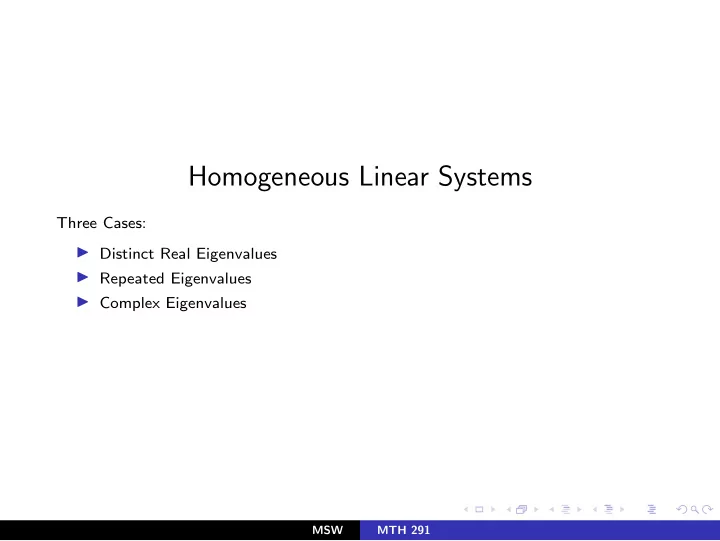

Homogeneous Linear Systems Three Cases: ◮ Distinct Real Eigenvalues ◮ Repeated Eigenvalues ◮ Complex Eigenvalues MSW MTH 291
Distinct Eigenvalues General Solution-Homogeneous Systems Let λ 1 , λ 2 , . . . , λ n be n distinct real eigenvalues of the coefficient matrix A of the homogeneous system X ′ = AX and let K 1 , K 2 , . . . , K n be the corresponding eigenvectors. Then the general solution of X ′ = AX on the interval ( −∞ , ∞ ) is given by X = c 1 K 1 e λ 1 t + c 2 K 2 e λ 2 t + · · · + c n K n e λ n t (1) MSW MTH 291
Repeated Eigenvalues 1. For some nx n matrices A it may be possible to find m linearly independent eigenvectors K 1 , K 2 . . . , K m corresponding to an eigenvalue λ 1 of multiplicity m ≤ n . In this case the general solution of the system contains the linear combination c 1 K 1 e λ 1 t + c 2 K 2 e λ 1 t + · · · + c m K m e λ 1 t (2) 2. If there is only one eigenvector corresponding to the eigenvalue λ 1 of multiplicity m , then m linearly independent solutions of the form X 1 = K 11 e λ 1 t X 2 = K 21 te λ 1 t + K 22 e λ 1 t t 2 2 e λ 1 t + K 32 te λ 1 t + K 33 e λ 1 t X 3 = K 31 . . . t m − 1 t m − 2 ( m − 1)! e λ 1 t + K m 2 ( m − 2)! e λ 1 t + · · · + K mm e λ 1 t X m = K m 1 where K ij are column vectors, can always be found. MSW MTH 291
Complex Eigenvalues Solutions Corresponding to a Complex Eigenvalue Let A be the coefficient matrix having real entries of the homogeneous system X ′ = AX , and let K 1 be an eigenvector corresponding to the complex eigenvalue λ 1 = α + i β , where α and β are real. Then K 1 e λ 1 t and K 1 e λ 1 t are solutions of X ′ = AX . Real Solutions Corresponding to a Complex Eigenvalue Let λ 1 = α + i β be a complex eigenvalue of the coefficient matrix A in the homogeneous system X ′ = AX and let B 1 = 1 and B 2 = i 2 ( K 1 + K 1 ) 2 ( − K 1 + K 1 ) (3) � �� � � �� � Re ( K 1 ) Im ( K 1 ) where B 1 and B 2 are column vectors. Then X 1 = [ B 1 cos β t − B 2 sin β t ] e α t X 2 = [ B 2 cos β t + B 1 sin β t ] e α t (4) are linearly independent solutions of X ′ = AX on ( −∞ , ∞ ). MSW MTH 291
Recommend
More recommend